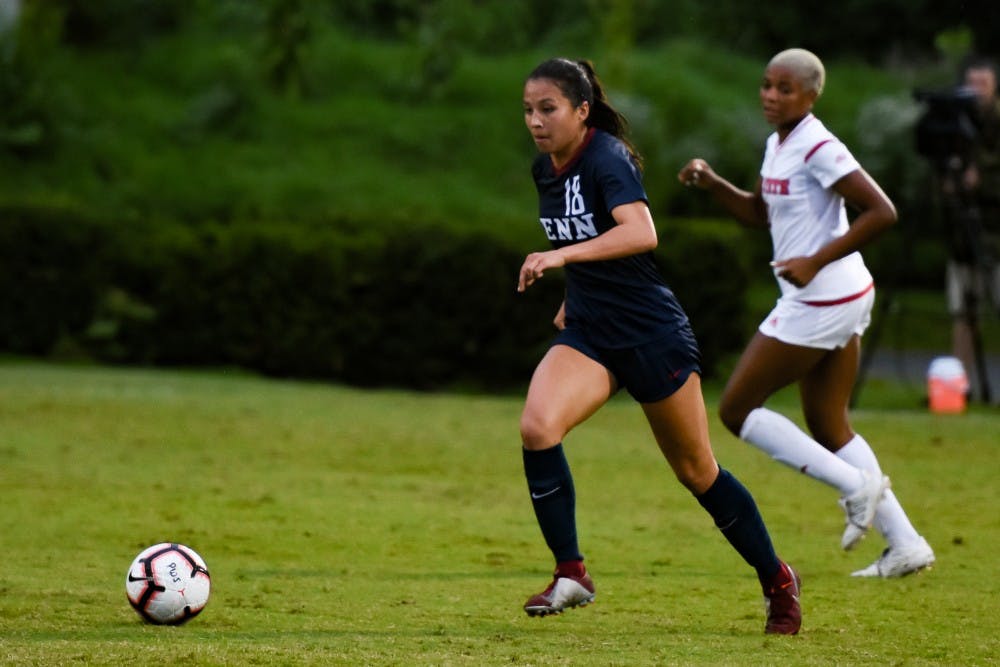
Last weekend, Penn women’s soccer put on a display of defensive excellence in a shutout of Harvard. This season, though, the team’s offense prowess deserves just as much acclaim.
The Quakers (6-1-1, 0-0-1 Ivy) haven’t always been known as prolific scorers. Last season, the team scored only 10 goals en route to a 5-8-3 record. This season, the team has already shattered last year’s mark, putting up 15 goals through half as many games.
This isn’t just luck; the team has changed its scheme and is improving in generating shots and in converting those shots into goals. Not only is the team generating over four more shots per game than last year, but its shooting percentage (a measure of the rate at which shots are converted to goals) has more than doubled.
A lot can change from season to season, but the Red and Blue think this improvement comes from several sources. The first is pretty routine for a team returning a lot of young players — as players develop their talents and learn to play as a team, they will get better.
“We haven’t really changed the personnel, I think what helps a lot is we had a lot of returners and we have been able to practice since the end of last season going into the spring,” junior midfielder Emily Sands said. “We’ve just been hearing the same thing over and over so now it’s really second nature.”
The other change members of the Quakers squad credit with helping catapult the team forward has been a nuanced but important shift in their style of play. Penn has played a style of attack this season that focuses on pressing more, moving onto the opponent's side of the field more quickly, and taking more risks in trying to create chances.
This shift not only allows the team to create more opportunities, it creates better opportunities because it forces opposing defenses back onto their heels and gives them less time to make decisions and organize a resistance to the attack.
However, this obviously comes with an increase in risk. Balancing this is a critical part of a soccer coach’s job.
“With no conference tournament we’re all wired, we understand that you can’t give up goals, but you also have to score and I think it’s that balance,” coach Nicole Van Dyke said. “We don’t wanna concede goals, but if we have to give up a little to get more scoring opportunities I think we’re gonna take that risk.”
A big part of what has allowed the Quakers to be more successful with a riskier style of play this season is their defense. Penn is known for having an excellent defense, backed by junior goalkeeper Kitty Qu, whose stats regularly lead the Ivy League. They can take more risks on offense because they know that, while they may give opponents a better chance on the other side of the ball, they have elite defensive stoppers waiting at the other end.
Penn’s not alone in this skill, though. Ivy soccer teams are coached well and play smart, which means they often have unrelenting defenses not dissimilar to Penn’s. This was on full display in the 0-0 draw against Harvard, and is something the Quakers will have to contend with if they want their scoring deluge to continue.
Improvements to the Penn offense isn’t all about technical game plans and individual growth, though. According to members of the team, there’s been a palpable culture shift this year, one spearheaded by the coaching staff and leaders on the team, that is trying to cultivate a culture of personal responsibility and positivity.
“Everyone is really focused on their role and how they can be impactful in their position and if you’re a forward or you’re an attacking midfield then your goal is to score goals and get assists and I think people are really taking responsibility in their role in their position on the team this year,” Van Dyke said. “
Sometimes, though, there’s more to soccer than physically besting one’s opponent.
For junior midfielder Kelsey Andrews, the mental game can be just as important as the physical. In order to improve there, the team has brought in some experts.
“Our coach started emphasizing something new at the beginning of the season which for me personally has helped a ton,” Andrews said. “We started doing a lot of lessons on optimism, she kind of coached us on mindset and we’ve been having lessons on it once a week where we have someone talk to us about different aspects of being optimistic, having a positive attitude.”
Thinking positively is important, but so is getting actual results. If the Quakers can continue to make both happen into the six remaining conference games, the rest of the league should watch out, because this year, Penn can score.
The Daily Pennsylvanian is an independent, student-run newspaper. Please consider making a donation to support the coverage that shapes the University. Your generosity ensures a future of strong journalism at Penn.
Donate







